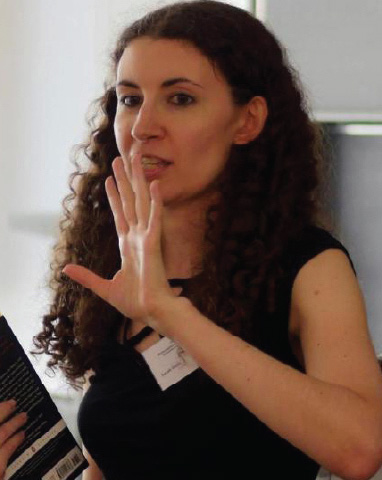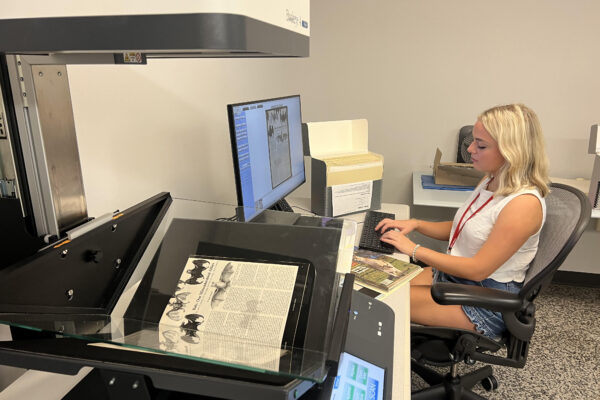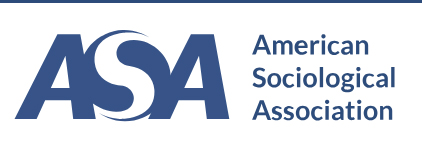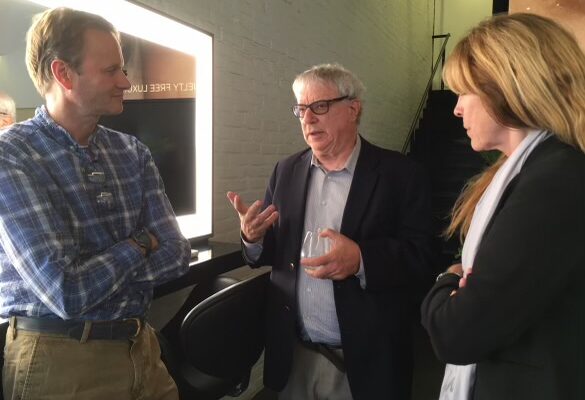In addition to Kaitlyn Kitchen, CAF and NSCU Libraries chose as a 2024 Research Fellow Sarah Scott, a professor of philosophy at Manhattan College who was writing a monograph on the moral philosophy of British philosopher Frances Power Cobbe (1822-1904). In addition to her fellowship at the Libraries, Scott was also a fellow at the National Humanities Center in Research Triangle Park in Fall 2024.
Although Cobbe was a well-known thinker in her day, publishing widely and writing editorials for the London evening newspaper The Echo that reached 100,000 readers, she has been largely forgotten. The influence of her 1878 essay “Wife-Torture in England” helped to pass the Matrimonial Causes Act, which enabled women to separate from abusive spouses. Her animal welfare activism included the founding of the Victoria Street Society (1875; now the National Anti-Vivisection Society) and the British Union Against Vivisection (1898; now Cruelty Free International). Sarah notes that, whether or not people know Cobbe’s name, her legacy lives on every time a woman is able to divorce an abusive spouse or an animal is saved from testing.
“At a time when domestic violence and animal experimentation were normalized, Cobbe developed a groundbreaking framework for understanding both as forms of torture,” Sarah says. “She explored why women and animals are seen as ‘beatable’ and as existing outside of moral law. She had to figure out what counts as evidence for moral arguments when patterns of sympathy lead most readers to dismiss the evidence of the suffering of women and animals. All of these problems are ongoing, and we can learn as much from Cobbe’s rhetorical tactics as we can from her moral theories.”
While Cobbe’s life has been written about, her moral philosophy has not. As a woman, Cobbe was not allowed to attend college, much less teach there. Her publications were also outside of the philosophical mainstream of her time. Sarah examined the diverse range of Cobbe’s writing, including little-studied modes of writing such as her correspondence, and to analyze her influences, interlocutors, and ongoing relevance.
“In fact, Cobbe was read more widely than most philosophy professors of her day,” Sarah notes. “She used the methods of academic philosophic essays, but published in accessible popular form, including hundreds of newspaper and magazine articles. Other writings include her lectures for women, published in The Duties of Women, which went through numerous editions in multiple countries, and her anti-vivisection pamphlets. Both are examples of how subcultures, either blocked from academia, such as women, or opposing establishment practices, such as anti-vivisectionists, can produce rigorous, alternative moral theories that still remain to be explored by current moral philosophers.”
In the Animal Rights Archive, Sarah traced the philosophic arguments used in nineteenth-century animal and anti-vivisection advocacy and related them to contemporary debates. Cobbe was a correspondent with figures as diverse as Charles Darwin, Lewis Carroll, Robert Louis Stevenson, and the Queen Victoria of England, and Sarah will sought out relevant works in the archives by others of Cobbe’s correspondents.
Sarah describes her work in the archive in the video below.





